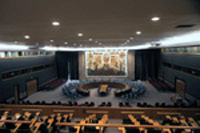
and human security

|
|

|
|

|
|

|
|

|
|

|
|

|
|
 |
|
 |
WCC United Nations liaison office - BACKGROUND The WCC's involvement with the United Nations (UN) can be traced back to the days before the formal establishment of either organization. In the aftermath of World War II, the US churches were very active in formulating Christian principles and hopes for the new organization and its Charter. |
|
||
|
When eventually the UN was founded in June 1945, the churches were seen to have contributed significantly to the content and spirit of the UN Charter; e.g. the provisions for human rights in a prominent place and for consultative mechanisms with non-governmental organizations. In 1946 the WCC (in formation) together with the International Missionary Council decided to form a joint Commission of the Churches on International Affairs (CCIA) to facilitate the future involvement of the churches in international affairs in general, and to relate to and work with the UN in particular. CCIA's initial focus was human rights, and the Commission played a significant role in drafting the United Nations Universal Declaration of Human Rights, which was adopted in 1948. Attention also focused on the promotion of peace with justice and freedom, the development of international laws, the international control and reduction of arms, and the furtherance of economic justice. The CCIA was one of the first non-governmental organisations to be granted General Consultative Status to the Economic and Social Council (ECOSOC) of the UN. In 1969, the CCIA moved its headquarters from New York to Geneva, which left the WCC United Nations Liaison Office in New York with about two permanent staff members. More than 50 years down the line a lot has changed. Nevertheless, many issues still remain the same. They still revolve around power and privilege, poverty, security, justice and conflict prevention. The gap between the rich and poor world remains and current economic system is increasing this rift, while there is a lack of political will on the part of the affluent countries to deal effectively with it. The dominance of Western powers over the UN, the lack of substantive reform of the UN institutions and the insufficient capacity of some peacekeeping missions has damaged the image of the UN, particularly in the South. However, in spite of its weaknesses, the United Nations remains the only global democratic forum that can mobilize and sustain international cooperation on the fundamental issues facing the world. Central to the WCC's mission is the Christian imperative to care for people and communities and advocate for peace and justice. Endeavoring to do that has implied work in areas such as human rights, disarmament, conflict resolution, sustainable development, and economic justice. Such efforts require advocacy with national governments and inter-governmental organizations. As the United Nations and its interventions have powerful impacts on global society and individual communities, working with the UN is of vital importance. The WCC has a long-standing commitment to the ideals embodied in the UN Charter, and is dedicated to the search for justice, peace and reconciliation in a chaotic, warring world divided along the lines of race, class and competing national and religious loyalties. |
|||
